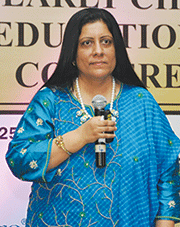 Sukanya Nandy
Sukanya Nandy
“As a parent, the basic values you pass on to your children form their foundation for life. As parents, we are responsible for what the kids are watching on the phone,” says Ruchita Shah, founder CEO of First Moms Club referring to the recent incident of eight students of a top-ranked Mumbai IB school being suspended for making sexually violent and explicit remarks on WhatsApp about their female classmates.
She continues, “As a mother of two boys, I am always stressing on gender equality, how to be respectful to the other gender, and having a pro-feminist approach to life. At home, if a boy sees that women are not treated well, it does impact the child and encourage such kind of behaviour.”
Dr. Swati Popat Vats, founder-president of the Early Childhood Association and president of the Podar Education Network asks, “I’m not in favour of these kids being suspended and think the school should have instead offered them counselling. If they are suspended, what are they going to do after the suspension period is over?”
 Vats says while 48 percent of the blame goes to the school, the rest 52 percent goes to the parents. “If schools want to take credit when their students perform well, they should also talk about this and inculcate moral values in them because we are talking about life.”
Vats says while 48 percent of the blame goes to the school, the rest 52 percent goes to the parents. “If schools want to take credit when their students perform well, they should also talk about this and inculcate moral values in them because we are talking about life.”
Having said that, Vats also says the fault lies with the parents, “These children must be imitating this kind of behaviour. They might have heard such language being used somewhere as a celebratory remark and hence they did not think twice about it. They were not talking about it in a hush-hush manner, rather openly in WhatsApp, and right in the home environment.”
She adds, “This isn’t just about a WhatsApp conversation but their attitude as well. A lot of body shaming and sexually explicit talk was going on and it is not possible that the children would have limited themselves to the chat. The school not taking appropriate action makes them more powerful.
When we were kids, our parents were scared of the school as they would think if they call us, something is definitely wrong in the kid. But today things have changed. Parents are like I have bought the school by paying a huge amount of fee, hence the school cannot tell me anything negative about my child. So, the schools too are covering such issues.”
 Meanwhile, Dr. Anjali Chhabria, psychiatrist at Mindtemple – a mental health centre in Mumbai and author of Death is Not The Answer: Understanding Suicide and the Ways to Prevent It, says, “With the advent of the internet and the digital age, students are being exposed to a large amount of easily accessible entertainment and information while at the same time, they are not appropriately equipped to process them. So it is imperative for schools to have a lot more counselors/experts, open discussions and awareness on emotional issues as well as sex and sexuality. That is when students can start making informed discussions.”
Meanwhile, Dr. Anjali Chhabria, psychiatrist at Mindtemple – a mental health centre in Mumbai and author of Death is Not The Answer: Understanding Suicide and the Ways to Prevent It, says, “With the advent of the internet and the digital age, students are being exposed to a large amount of easily accessible entertainment and information while at the same time, they are not appropriately equipped to process them. So it is imperative for schools to have a lot more counselors/experts, open discussions and awareness on emotional issues as well as sex and sexuality. That is when students can start making informed discussions.”
She further adds, “There’s a lot of information coming in but nobody’s telling them how to deal with it. I have done a few TED talks and I told everyone the next time I give a talk, it will only be on ‘sex and sexuality’. Later, three top schools in Mumbai invited me for a talk and I told them this is the only topic I will talk about. They all have turned me down.
Recommended: Obsessive-compulsive disorder in children
This proves that most schools are extremely apprehensive about discussing this subject, while they should be the ones taking the initiative. There are teenage pregnancies happening every day, students calling out names to each other which affects their self-esteem, leads to depression and suicidal thoughts. Their behaviour is driven to a large extent by sexual obsessions; maybe they watch too much porn and this needs to be addressed urgently.”
Vats explains, “Empathy, ability to differentiate right from wrong, courageously standing up to bullying, ability to understand the repercussions of their actions, respect for the other sex and language is missing in these boys.”
Chhabria also says, “30-40 percent of emotional disorders start before the age of 14. Many a times there is an emotional disorder and obviously the child will not know about it. Their perspective and attitude are clouded by what they watch and since it is not openly discussed, it ultimately reaches a culmination point.
Also read: Social media overuse adversely affects mental health
There’s also the mob mentality. A child is often stressed about having to prove himself a ‘hero’ to his peers and a child cannot be good in every subject. Suddenly, the internet and digital space lures him with an opportunity to become a hero and start building his identity. Teenage is all about identity formation. They are also getting the knowledge that necessarily may not be from the right place and that might confuse them. About homosexuality, from Netflix, from popular culture, media, etc and there’s no way to discuss it openly which needs to change.”


























